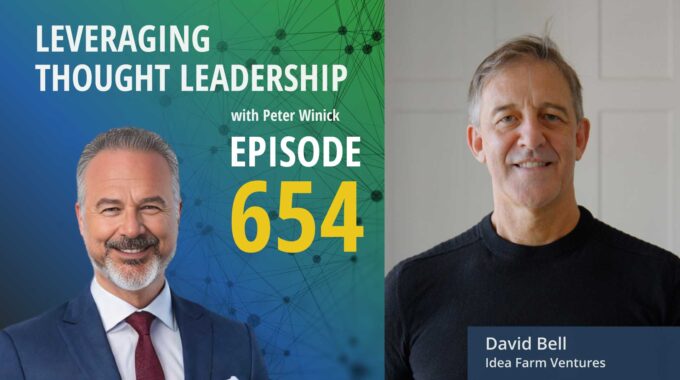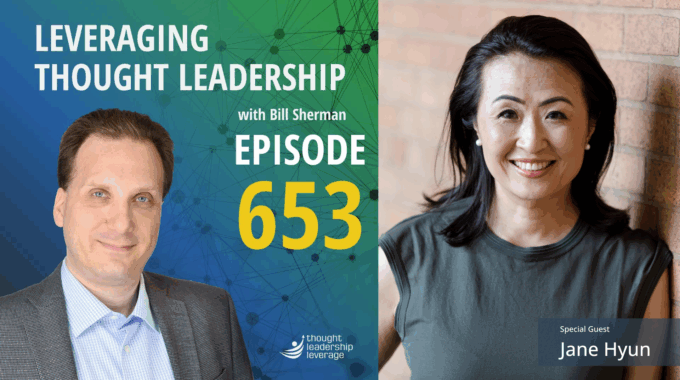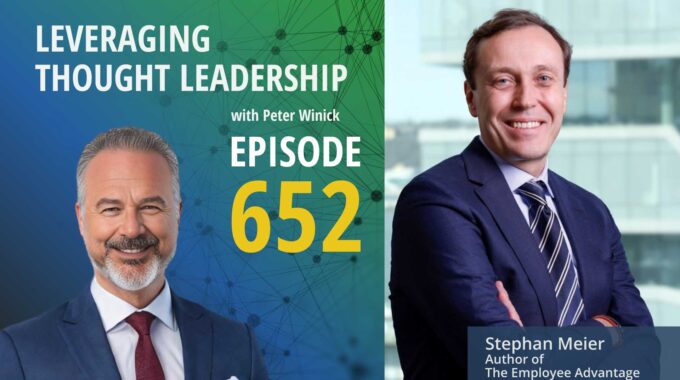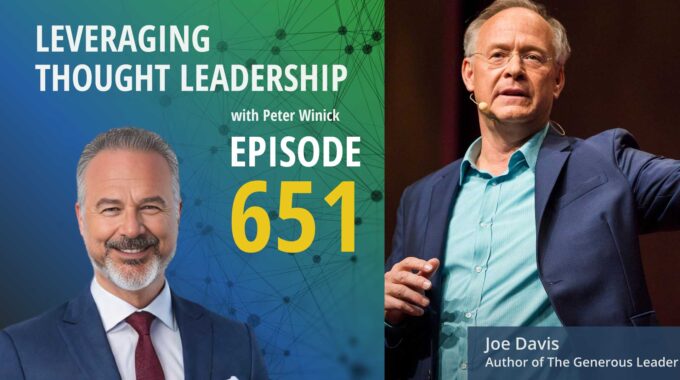Turning frameworks into funding: The hard truth about scaling thought leadership. This episode explores how…
Leveraging Thought Leadership With Peter Winick – Episode 125 – Claude Silver
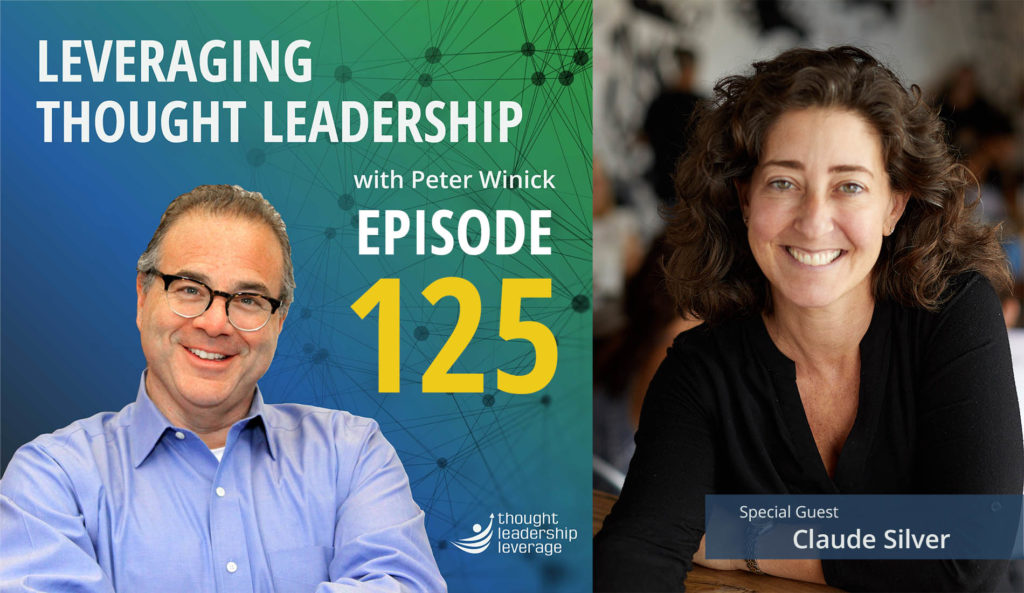
Thought leaders are open books; they have to continually talk about their values, their purpose, and their goals. So, where do you stand?
Our guest is Claude Silver, the Chief Heart Officer at Vayner Media, and self-described “Emotional Optimist Coach, Manager, and Mentor.” Today, she talks about her path toward becoming a thought leader, and how she hopes to guide others.
Claude defines “Emotional Optimist,” and talks about bringing a sense of humanity back to the work place. She discusses personal ethics and perception versus content and IP, and talks about changing our perspective about personality and content creation. Are you an Emotional Optimist?
If you need a strategy to bring your thought leadership to market, Thought Leadership Leverage can assist you! Contact us for more information. In addition, we can help you implement marketing, research, and sales. Let us help you so you can devote yourself to what you do best.

Transcript
Peter Winick Welcome, welcome, welcome, this is Peter Winick. I’m the founder and CEO of Thought Leadership Leverage and you’re joining us on the podcast today, which is Leveraging Thought Leadership. And today, my guest is someone I’ll call a new friend. We met recently and it was one of these instant sort of like times you meet someone, you know, you’re going to be friends for a long time. So Claude Silver is currently the chief heart officer at Vener Media. She’s an emotional optimist. She’s a coach. She’s a manager. She’s a mentor. And she is now sort of developing some of our own content and thought leadership and all those sort of fun things. And I thought she’d be a great person to have on today. So thanks for joining us.
Claude Silver Thank you. Peter Winick, I’m honored and I appreciate being in front of your audience today.
Peter Winick Great. No pressure. But there’s dozens, if not 20 out there in the nation.
Claude Silver Maybe twenty five after today.
Peter Winick Exactly. So you are a respected executive. Right. Coming from the advertising side and your adventure now, chief heart officer. All of it. But what’s the first? Let’s start with sort of the gist of your content. So what is what is it? What does it mean to be an emotional optimist?
Claude Silver For me, an emotional optimist is someone that can understand and have great respect for the range of emotions that us humans go through on a minute by minute basis.
Peter Winick Right.
Claude Silver And is able to see the sunny side, the positive side of whatever it is that we’re going through. And I don’t mean like you’re in a tragic accident and things happen for a reason. That’s not what I mean by an emotional optimist. I mean, I hope that you will get through it because life is about thriving, not just surviving. So let’s find let’s find out how we can get you through that.
Peter Winick So you’re sort of earlier in this path. Well, many in terms of developing this as thought leadership that you’re passionate about, thought leadership that you’re speaking about, what leadership that you’re writing about. Talk a little bit about sort of how you start to develop the underlying principles and concepts and then tested and start to get it out and play with it in the marketplace and into the universe. What is that journey for you?
Claude Silver Yeah, I love that question because I’ve really been so fortunate to be here at Vener Media where there’s eight hundred people I work for on a daily basis. And so there’s no better or bigger sandbox than this to test out and try out methodologies, methodologies, tools, tips, parables, whatever you whatever you want. My tool kit is very full of things that I’ve amassed in short lifetime. And so I’m an ape. Try different things based on the situation scenario that I’m faced with any individual. And that could be anything from taking a page out of Tara Brocks Buddhist psychology group we could think about. Peter Winick Siegelman’s positive psychology, which I lean on quite a bit. I also do a lot of work when it comes to just poaching. Quite frankly, walking someone through with their values are what is their purpose? How do we find a purpose? What is a North Star guiding principle? I might take out Man’s Search for meaning by Dr. Frank, but I mean, I play with a lot of different things at my fingertips that come to me in that moment. It’s not you know, I don’t I’m not a theorist.
Peter Winick So I love the sort of the concept that Vener is your laboratory, right? So you’ve got eight hundred lab, which you most invest in hoodies. Right. Running around there looking for help and support. And just during the normal course of your work, you’re applying various concepts that you are familiar with in situations that make sense. How do you sort of sift through that and sort of come up with the stuff that uniquely cool versus, you know, the old books? One of my favorite books and there’s lots of places with that. But how do you sort of put these things together to come up with the, you know, the smoothy that is yours?
Claude Silver Yeah. This is gonna sound so incredibly simple, Peter Winick. But I think of myself as a servant leader. I think of what I do very much as in the service of I find that I am a natural born coach. And I think about what we do here with it within the walls of an advertising agency, and especially now that I’m overseeing everything that is people in H.R. as hospitality for me is logit hospitality. So there isn’t a you know, while I might call on the great masters and those that have written them and come up with great theories, I think of the Golden Rule. I live my life by the Golden Rule, and I try to teach and inspire from that place. And that’s where I bring the word hospitality into it, because you do unto others as you would have them do to you. You want to treat people as your artists are just treated you at Starbucks. Hopefully they spoke correctly. And you know, there’s no magic to being in service of people. For me, it is very much a please and thank you economy that I come from and that I work from and from that place, I’m able to promote emotional optimism in the way of helping someone be big in the room, take up space, see, see the good in themselves, understand that they are enough, that they are worthy to be in whichever room they’re asked to be. And you bring that into the collective and let’s just call it one team, one dream kind of methodology or modality. But I’m it’s really silly. I’m very no one for all and all for one and Three Musketeers. So maybe that’s maybe that’s my juvenile my juvenile mindset. But it works. For me, and I feel like that is something that I don’t see out in the marketplace. I think I almost think what I talk about is so common sense and so simple that it might be too simple for many to grasp it. And they know there’s more theory and more quiet towards law.
Peter Winick But common sense is far less common than it ought to be. Right.
Claude Silver There you go. Yeah.
Peter Winick So, yeah. How are you? Now, you’ve got a very demanding job. It’s a global organization. I don’t even know what the rate of growth is from my head. Tell perspective as I imagined 20, 30 percent a year. You’ve got a busy day job, right? And then this is part, you know, a big component of how sort of the cloud operating system of being a human right. But now you’re looking to sort of get it out into the world a little bit. Tell me, did you give us some examples of how you do that in a way that that is time effective? And, you know, because it’s easy to say. Yes, it’s hard to say no to opportunity. So how do you find places to speak and sort of like minded communities and places to sort of nurture the content as well as explore things?
Claude Silver Well, that’s a that’s an another way that I’m extremely fortunate, I think, in not only working for Gary Vaynerchuk, but being having this platform, quite frankly, of Vener media to play. And because everything that I have, every stage I’ve been on, every place I’ve been able to speak or teach has come to me. And so I’ve been able to be reactive. Obviously, I want the paradigm to change towards being much more proactive in going after the opportunity and making sure I’m on those bigger stages. And so that’s something very much my plan for Q2 on out for twenty nineteen.
Peter Winick Well let me let me push on that though. Even though things are coming to you, I would argue or assume that you’re not saying yes to everything and because you’ve got a busy job. So you know when you’ve got, you know, 10 invites in front of you to come to Switzerland or do a webinar or whatever, whatever, whatever. How do you make choices to say, you know what? Yeah, that’s worth my time. That would be interesting. Either public or financial curiosity. That’s the right audience. How do you how do you go through that process? Because times are scarce.
Claude Silver Yup. Times are scarce. So anything in different geographies, I’m most of the time. Yes. To whether or not that is Dubai. I was in Bratislava in July. I was just in last week. I was in Vienna. London is an obvious one. So making sure that I can scale my message to other geographies is extremely important. I do not want to be known as a North American thought leader. I want to be global. I want to impact humans, not just humans on this continent.
Peter Winick So that’s what I want. I want to dive into that for half a second and go back to the question. So that’s an interesting approach because most folks come at it from whatever their perspective is, north-american, whatever the case may be, and then say, oh, yeah. You know what, I do want to be global. What do I need to add into this? How come this started with a global perspective? And I know you’ve worked globally, but why is it so important to you early on? I find that really interesting.
Claude Silver Yeah, it’s there, actually. There’s no second thought to it. This is a macrocosm. I mean, humans, each and every human is unique in each and every culture is unique. And I want to understand and respect the details and the nuances, the inside of each and every culture. And I find it a credible honor when I’m invited into those places to observe and then to present and to share. So for me, I’ve decided to start with the well rather than the fosset. Force it to me would be maybe the easier reach staying here in America, certainly staying on the coastal cities, but it’s much more interesting to me to be a stranger in a strange land. I think that that’s just really who I am in many, many ways. I’ve never really put it that way, but it makes sense for me to. To go outside of my comfort zone. That is who I am, and so it’s not a it’s never been a question for me that I wasn’t. I am going to say yes when it comes to different geographies and I am going to say yes when it comes to people that are different or groups that are different than me. So I never considered myself an H.R. professional because I didn’t start in the H.R. world. Sure. When I am asked to speak at Sherm events or I’m asked to speak at CHRO national conferences, I say yes. Which is interesting because I am presenting to them something that again, common sense isn’t so common sensical, but I’m really going against the grain when I’m talking about bringing humanity and back into the workplace. And I’m looking at S.H. Oros, who are like, Hey, kid, you’ve been doing this for 35 years. What are you talking about? Right. Watching our faces and seeing them from the audience, how they’re lighting up, whether they’re doing a head nod gives me a lot of juice to let me know that I’m on the right path when it comes to that particular audience segmentation.
Peter Winick I think the important piece there is you’re not necessarily one of the obvious in that trial. Right. You’re a bit of an outsider, to say the least, in terms of what a typical CEO general looks like. So what are the other things that you were thinking about doing, etc. as you’re developing your thought leadership?
Claude Silver So I really want to be able to. Formulate more master class and whether or not that is in person or we take that online, it’s something that’s important to me because a the intimacy that I enjoy with a group of 20 people getting together for an entire day, day and a half and going there is fascinating and fun for me. You know, I’m an old rebounder, so others to small groups tackling big challenges. And so that’s the first thing I think. Masterclasses or something that I’m fascinated by. And I want to get more involved in that online courses. Of course, much more keynoting and then writing a book, two or three. And that is something you and I have spoken about in terms of what does Claude’s stand for? What are we solving for? And I’m still working through that. I think that if I asked 20 people this minute on LinkedIn or Instagram, they’d be able to tell me. But I don’t know if I embody that yet. You know what I’m saying?
Peter Winick Even though they’re telling you it’s a response to their perception of you and not necessarily the content that you want to shape. Right. So just because everybody precedes you one way doesn’t mean you’re forced to go there from a content perspective because you get to make the choices. You get to design this from a blank slate, if you will.
Claude Silver Yeah, that is actually so true. So it’s been the message, the inspiration out there. I’d like people to chew on some meaty subjects with me and. And come out on the other side feeling whether or not they feel elated. Later inspired. That is what juices me.
Peter Winick Right. Give me an example. One of the things that you said are doing these sort of in-depth master classes. Right, which is different than Akino, where the keynote is 60 Minutes. It’s pretty much scripted, right. You may go off track a little bit here and there, etc. But when you go to a workshop, there’s depth there. What are the things that you’re going to cover or questions you’re going to ask or hope happens in that deeper experience than the sort of a drive by, if you will.
Claude Silver The first one is actual storytelling, and I know everyone talks about storytelling. But I do think, you know, someone that is sad in many 12-Step meetings in my life. There aren’t any stories to be told. Right. I’m interested in the climb. I’m interested in how we got to the bottom and how we kicked and kicked and kicked up to the top. And that’s very specific. Very, very different. And so it takes a different courageous person, courageous mindset to come into something like that. Recognizing that there will be some tears and some celebrations and some claps and certainly some arm chills when you have to model that as well, because you mean you can’t sort of facilitate a group and say, okay, everybody tell me your deepest, darkest secret and get emotional and cry and I’m going to sit here and take some notes or check my e-mail or something while you’re doing that, which is why I will say, quote unquote, outing myself on social media, which I started to do about a year, 18 months ago, has been not only cathartic for me, it has been my way to get to let people know me as my friends would know me, if you will, not sharing all the all the gore and horror that I went through. But I’m sure certainly sharing love. I have been there. I have been at the bottom even today. I put up a post on Instagram, which talks about something that I have gone through at 28. Right. Right. I know I started doing that on social and I started doing that here at Vener, maybe because it was very apparent that people were their perception of me was, you know, she has this cush job and she just like plopped into a role and a charge, whatever, whatever. And it’s like, oh, man, if you only know what it’s like to grow up in a house where I took S.A.T.’s three times untimed and still got a ten 50, like it was hard. It might have led me to do some self-sabotaging behaviors and lost a few friends who took their life, you know, that kind of stuff. And I I’m interested in sharing that in an authentic way with people that are interested in listening.
Peter Winick Well, I think everybody has their story, right? Everybody has their baggage. Everybody has something want to get out on. And there’s a balancing act. And this is really where it gets interesting, where, well, what’s appropriate in the workplace and what’s not, what’s true for and you know, you have to do that in a way that allows people sort of under the hood a little bit. But there’s gotta be some sort of lines, if you will. And again, this is probably where the traditional S.H. Oros get really nervous and say, well, that’s why we don’t do any of that, because there might be some risk that you get up. So how do you how do you manage that piece?
Claude Silver Well, I think I manage it in the way that I started this conversation, which is in a very human in a very human to human way, which is it’s empathy. It’s I got I see you. I got you. I’ve been there. I understand. And I’m going to be there with you along the ride like this isn’t going to be one and done. Thank you for your thousand dollars for the masterclass. And I think don’t call me. There has to be some kind of we’re going to create a relationship with one another. And I hope I hope I do that with my the books that I sell as well, where we have a lasting relationship and whether or not it is one of complete neutrality or it’s a little bit lopsided. I’m okay with that. I I am I’m very, very clear that I am here to be of service. I don’t question that. My life’s purpose.
Peter Winick You know, I love it. So as we start to wrap up here. What advice would you have for folks that are out there that are thinking, you know, I’ve got something, maybe I don’t have something. Where do I start? Well, you know, they’ve got something that they’re passionate about. They’ve got something that they think they want to get out into the world. What are the things that you would suggest that they consider?
Claude Silver Well, in this in this magical era of social media, I would absolutely consider posting it. Creating a piece of content or 10. And seeing what the reaction is. That’s what I would do. You haven’t. You have a focus group that is right there in front of you. Like it or not. And so you also have to be careful for what you wish for. That’s for sure. There will be some people out there that are laughing. I saw someone comment on one of my Instagram LinkedIn posts today. Yeah, they’re laughing. That’s cool because it just juices me.
Peter Winick Well, and you and you don’t have to respond to everything that’s out there. I mean, look for the quarter. There are people that are just behaving online that are just not nice.
Claude Silver Yeah, it’s easy to hide behind that facade. However, to start, one needs to start there. It’s so easy to procrastinate and it’s so easy to think like that’s not the perfect picture. My grammar might be just throw it up there because it’s only up there for a blink and time and you might as well see how it lands. But more than that. Peter Winick, you might as well see how you feel once it’s out there. Bad, I think is interesting.
Peter Winick Right. Right. So that’s that cathartic, that release like it’s out. So. Well, this has been awesome. Thank you. I want to thank you for being you and being transparent and looking forward to see how things unfold. We will be seeing a lot more amazing stuff coming from you in the months and years to come. So thanks for sharing it today.
Claude Silver Thank you, Peter Winick. Great to talk to you.


